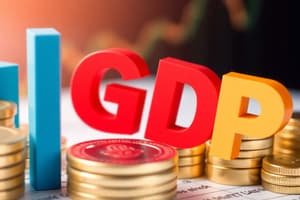Podcast
Questions and Answers
What is the main focus of microeconomics?
What is the main focus of microeconomics?
- Analyzing inflation trends
- Studying individual consumer and business decisions (correct)
- Examining employment rates
- Understanding GDP growth
Which of the following is a key aspect of macroeconomics?
Which of the following is a key aspect of macroeconomics?
- Forecasting individual income distribution
- Tracking consumer spending patterns (correct)
- Measuring individual productivity
- Analyzing microeconomic principles
What does macroeconomics specifically focus on?
What does macroeconomics specifically focus on?
- Price volatility of specific goods
- Micro-level employment rates
- Individual business cycles
- Foreign exchange rate fluctuations (correct)
In macroeconomics, what is a common method to forecast future developments?
In macroeconomics, what is a common method to forecast future developments?
Which of the following is NOT a factor typically considered in macroeconomics?
Which of the following is NOT a factor typically considered in macroeconomics?
What is the primary focus of macroeconomic principles?
What is the primary focus of macroeconomic principles?
What is the primary purpose of using insights into historical trends and current conditions in macroeconomics?
What is the primary purpose of using insights into historical trends and current conditions in macroeconomics?
How does macroeconomics contribute to policymakers' decision-making processes?
How does macroeconomics contribute to policymakers' decision-making processes?
What is the overarching goal of macroeconomics in relation to global efforts?
What is the overarching goal of macroeconomics in relation to global efforts?
How does an understanding of broad-scale economic movements benefit individuals?
How does an understanding of broad-scale economic movements benefit individuals?
What is one effect of engaging with global market forces according to the text?
What is one effect of engaging with global market forces according to the text?
Flashcards are hidden until you start studying
Study Notes
Economics is a social science that studies how people manage resources, including their time, money, labor, and energy. At its core, economics involves understanding the behavior of individuals and groups when faced with choices among goods and services they want to consume. There are two main branches within this field—microeconomics, which focuses on the decisions made by individual consumers and businesses; and macroeconomics, which looks at big picture issues such as GDP growth, employment rates and inflation. In essence, microeconomic principles help us understand why prices fluctuate, while macroeconomic principles explain what causes changes in overall economic indicators like interest rates or unemployment figures.
Macroeconomics deals specifically with large scale economic processes and events that affect entire economies or society as a whole. These might include factors affecting total output, income distribution, business cycles, foreign exchange rate fluctuations, price levels, fiscal policy, monetary policies, and international payments. A key aspect of macroeconomics is measuring these processes through national accounts statistics, tracking trends over time, especially those related to gross domestic product (GDP), consumer spending and saving patterns, investment activities, and productivity measures.
One important function that macroeconomists perform is forecasting future developments using predictive models based on past data. By combining this information with insights into historical trends and current conditions, they can make educated predictions about likely outcomes in areas like tax revenues or public expenditures, job creation or loss, or trade balances between nations. This type of analysis helps policymakers develop strategies for promoting sustainable development, maintaining stable financial systems, and fostering healthy markets both domestically and internationally.
In summary, macroeconomics serves as a tool for understanding broad-scale economic movements and making forward-looking projections. With this knowledge, we can better plan our personal finances, engage effectively with broader market forces, and contribute constructively towards global efforts aimed at creating prosperity for all people everywhere.
Studying That Suits You
Use AI to generate personalized quizzes and flashcards to suit your learning preferences.




